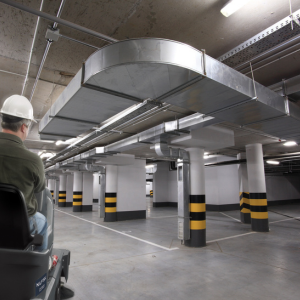Moving Beyond The Mop & Bucket
Traditional cleaning methods can no longer keep pace with hygiene demands of modern commercial and industrial settings. As businesses aim to meet higher cleanliness and safety standards, upgrading to professional-grade cleaning equipment has become not just beneficial, but necessary. Whether you're operating a warehouse, school, shopping centre or healthcare facility, selecting the right floor cleaning machine is key to improving efficiency, reduce labour costs, and ensuring a safer environment for both staff and visitors.
This guide walks you through the considerations for choosing between walk-behind and ride-on floor scrubbers and sweepers. It also features examples from reputable equipment brands, helping buyers compare options and make informed decisions based on real-world applications.
Walk Behind Scrubbers: Efficiency for smaller areas
Walk-behind scrubbers are effective for cleaning hard floors in small to mid-sized commercial and industrial spaces. These machines combine washing and drying functions, offering an efficient alternative to manual mopping. When choosing a walk-behind scrubber, consider the size of the area, the type of flooring, the desired power source, and your budget.
Walk-Behind Or Ride-On? Which Is Right For Your Space
While the difference between a walk-behind and a ride-on floor cleaner might seem minor at first glance, the real-world impact on labour, productivity, and operational costs can be significant. Choosing the wrong type can result in inefficiencies, equipment strain, and higher long-term expenses.
Ride-on machines are generally the best choice for large-scale environments such as warehouses, airports, and big-box retail stores. They allow staff to clean significantly more floor space in less time, with far less physical effort. This not only increases cleaning efficiency but also reduces fatigue and lowers labour costs over time. For facilities with frequent or extensive cleaning requirements, ride-on models often deliver a faster return on investment.
In contrast, walk-behind floor cleaners are typically better suited to smaller spaces or facilities with tight layouts - such as schools, aged care homes, or compact retail stores. Their compact size and manoeuvrability make them ideal for navigating narrow aisles, doorways and cluttered areas. They also tend to be more affordable upfront, making them an attractive option for businesses with smaller budgets.
However, it's important to recognise their limitations. Using a walk-behind machine in a space better suited to a ride-on can lead to several issues:
- Increased physical strain on operators
- Longer cleaning times
- Premature wear and tear on the machine
- Higher labour costs due to inefficient workflows
Before committing to a purchase, take the time to assess your facility's layout, total floor area, and cleaning frequency or request a demonstration. Matching the machine type to your operational needed will ensure better long-term performance, reduced overhead, and a cleaner, safer environment.
Factors to Consider When Choosing Between Walk-Behind and Ride-On Scrubbers
Selecting the right machine involves more than just size and price. Here are the core factors to consider when selecting the most efficient and cost-effective cleaning solution for your facility.
1. Scrubber or sweeper?
Start by identifying the type of debris you need to remove:
Sweepers are best for dry, bulky materials such as dust, paper, litter, or leaves. They're ideal for warehouses, car parks, or storage facilities.
Scrubbers are designed for finer soils such as grease, grime, and foot traffic residue. These machines apply a cleaning solution, scrub the floor, and vacuum up the dirty water in a single pass.
For environments that deal with both dry and wet debris, consider a combination sweeper-scrubber model for maximum versatility.
Sweepers are best for dry, bulky materials such as dust, paper, litter, or leaves. They're ideal for warehouses, car parks, or storage facilities.
Scrubbers are designed for finer soils such as grease, grime, and foot traffic residue. These machines apply a cleaning solution, scrub the floor, and vacuum up the dirty water in a single pass.
2. Size of the cleaning area
The square footage of your space will determine the machine size and type:
Under 1000 m² : Compact walk-behind scrubbers are typically sufficient.
1000- 5000m² : Consider larger walk-behind models or small ride-on units for balance.
Over 5000 m² : Ride on machines are essential for efficiency and cost savings.
Remember, bigger isn't always better. Choose a machine that suits the layout and daily use of your space.
3. Cleaning area & frequency:
Walk-behind models are ideal for small to medium spaces, narrow aisles, and congested areas such as retail stores, kitchens, or small warehouses. For large, open areas over 1500 square meters, a ride-on scrubber is generally more efficient.
Assess your site layout for any physical constraints:
Measure the narrowest aisles, doorways, or passageways.
Check for tight corners, dead ends, or areas with frequent obstructions.
Evaluate whether the machine must access multiple floors via lifts or ramps
Make sure the cleaning path width and turning radius of the machine can handle the actual space without needing manual follow-up.
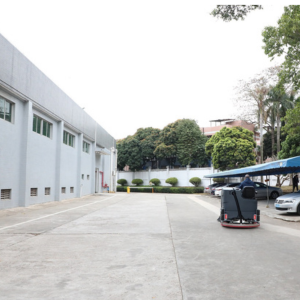
Measure the narrowest aisles, doorways, or passageways.
Check for tight corners, dead ends, or areas with frequent obstructions.
Evaluate whether the machine must access multiple floors via lifts or ramps

4. Floor type and soiling level
Different surface require specific brushes- rough or uneven warehouses floor needs stiff brushes, while polished or sealed floors benefit from softer ones. There are various floor types such as-
Light dust and fine particles: Use soft nylon or polyester brushes.
Heavy or sticky debris: Opt for wire-reinforced brooms or stiff bristle brushes.
Uneven or porous floors: Cylindrical brushes traditionally provide better performance on uneven floors.
Grease or oily residue on floors: Use of oil resistant squeegee rubbers for improved drying and increased life.
Smooth or polished surfaces: A range of scrubbing pads are available for various floor types, delicate to aggressive.
If your facility includes multiple floor types, consider a machine with adjustable pressure and interchangeable cleaning heads.
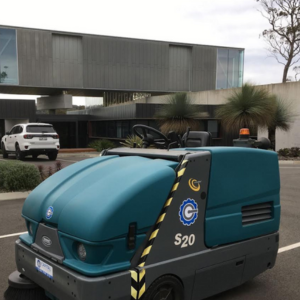
Light dust and fine particles: Use soft nylon or polyester brushes.
Heavy or sticky debris: Opt for wire-reinforced brooms or stiff bristle brushes.
Uneven or porous floors: Cylindrical brushes traditionally provide better performance on uneven floors.
Grease or oily residue on floors: Use of oil resistant squeegee rubbers for improved drying and increased life.
Smooth or polished surfaces: A range of scrubbing pads are available for various floor types, delicate to aggressive.

5. Power source: Battery vs Corded
Battery-operated scrubbers offer flexibility and eliminate trip hazards from cords, making them safer for daytime cleaning. Electric (corded) versions can be more affordable but limit movement. Many modern units now use lithium-ion batteries for extended run times.
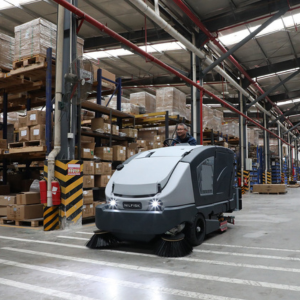

6. Eco-friendly and sustainable features
Sustainability is an increasing priority in equipment selection. Many brands now offer machines with features that reduce water and detergent use while maintaining powerful cleaning performance. Look for:
Water-saving modes (e.g. Fimap's ECO mode)
Low-noise operation for sensitive environments like hospitals and schools
HEPA filtration to reduce airborne dust and allergens
Detergent metering systems to avoid overuse
These features not only benefit the environment but also lower your ongoing operational costs.
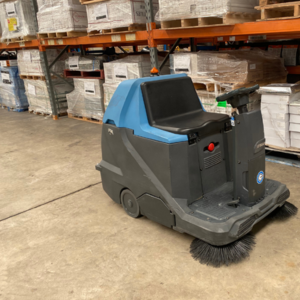
Water-saving modes (e.g. Fimap's ECO mode)
Low-noise operation for sensitive environments like hospitals and schools
HEPA filtration to reduce airborne dust and allergens
Detergent metering systems to avoid overuse

7. Labour Vs Equipment Cost
It's crucial to compare the upfront equipment cost with the long-term savings in labour and cleaning efficiency. Ride-on machines may cost more initially but often deliver:
Reduced cleaning time
Less operator fatigue
Fewer man-hours per clean
For example, a facility that spends 3 hours per day cleaning with two-walk-behind machines might reduce that to 1 hour with a single ride-on-unit. That's substantial reduction in wages and productivity loss.
Many businesses see ROI within 12 to 18 months from labour savings alone.
Reduced cleaning time
Less operator fatigue
Fewer man-hours per clean
8. Maintenance & upkeep
To keep your machine running efficiently, regular maintenance is non-negotiable. Evaluate how easy the unit is to service. Tol-free brush replacement, simple tank access, and user-friendly maintenance points can reduce downtime and operating costs.
Routine upkeep prevents costly breakdowns and extends machine lifespan, improving your overall investment.
Popular Machines from Tennant, Nilfisk & Fimap
Here are some well-regarded models available at Capital Equipment:
Large & Industrial Ride-on Scrubber
These are high-capacity machines designed for cleaning the largest indoor spaces, such as distribution centers, airports, convention centers, and large factories.
| MODEL | CLEANING PATH | TANK CAPACITY | POWER SOURCE | KEY FEATURES | BEST FOR |
| TENNANT T16 | 91 cm (36 in) | 190L Solution, 225L Recovery | BATTERY | Heavy-duty industrial build, high brush pressure (up to 114kg), Touch-n-Go™ controls on steering wheel. | Heavy-duty manufacturing and large warehouses. |
| NILFISK SC6000 | 101.6 cm (40 in) | 190L Solution, 190L Recovery | BATTERY | SmartKey™ system (sets user permissions), "ClearView" design, automatic speed reduction on turns. | Logistics depots, airports, and large shopping centres. |
| FIMAP MAGNA PLUS | 90 cm (35 in) | 190L Solution, 200L Recovery | BATTERY | Very high brush pressure (up to 150kg), "Intelligent Drive" touchscreen, cruise control. | Industrial facilities and large commercial areas. |
| VIPER AS1050R | 98 cm (39 in) | 200L Solution, 200L Recovery | BATTERY | The largest Viper model, simple LCD display, "Eco Mode" for up to 5 hours runtime, robust. | Very large retail spaces and educational facilities. |
Compact Walk-Behind Scrubbers
These models are designed for small, often congested areas like cafes, small retail shops, kitchens, and washrooms.
| MODEL | CLEANING PATH | TANK CAPACITY | POWER SOURCE | KEY FEATURES | BEST FOR |
| Tennant T291 | 50 cm (20 in) | 50L solution, 50L recovery | Battery | Simple LCD display, self-levelling brush, compact but robust build. | Small-to-medium retail, hospitals, and schools. |
| Nilfisk SC250 | 34 cm (13.4 in) | 6L solution, 6L recovery | Battery (Lithium-ion) | 3-in-1: Sweeps, scrubs, and dries. Very lightweight, low profile for cleaning under furniture. | Cafes, kitchens, and tight corners. |
| Fimap Genie B | 35 cm (13.8 in) | 10L solution, 10L recovery | Battery | Extremely compact, handle adjusts to clean under tables, parabolic squeegee for 180° turns. | Restaurants, small clinics, and offices. |
| i-team i-mop XL Pro | 46 cm (18 in) | 4L solution, 6L recovery | Battery (Swappable) | 360° "mop-like" flexibility, extremely manoeuvrable, lightweight, easily transportable. | Replacing manual mops in any cluttered area. |
| Viper AS380B | 38 cm (15 in) | 15L solution, 15L recovery | Battery | Foldable handle for easy storage and transport, simple controls, very compact. | Small shops, offices, and budget-conscious users. |
Mid-Size Walk-Behind Scrubbers
These are built for productivity in large spaces like school hallways, supermarket aisles, lobbies, and warehouses.
| MODEL | CLEANING PATH | TANK CAPACITY | POWER SOURCE | KEY FEATURES | BEST FOR |
| Tennant T391 | 70 cm (28 in) | 70L solution, 70L recovery | Battery | Self-propelled (traction drive), wide dual-disk path, "ECO mode" for quiet/reduced water use. | Large hallways, hospitals, and medium-sized retail. |
| Nilfisk SC401 | 43 cm (17 in) | 30L solution, 30L recovery | Battery | Self-propelled, OneTouch™ button activates all functions, very quiet operation. | Offices, small supermarkets, and healthcare. |
| Fimap Maxima 60Bt | 60 cm (24 in) | 60L solution, 65L recovery | Battery | Self-propelled, robust chassis, intuitive controls, large tank for its class. | Supermarkets, warehouses, and industrial spaces. |
| i-team i-mop XXL | 62 cm (24.4 in) | 6L solution, 8L recovery | Battery (Swappable) | The same 360° flexibility as the XL but with a much wider path. High brush pressure. | Large, cluttered areas like food courts or lobbies. |
| Viper AS5160T | 51 cm (20 in) | 61L solution, 61L recovery | Battery | Self-propelled (traction drive 'T'), large tanks, very user-friendly, great value. | General purpose cleaning in schools, hotels, and retail. |
Compact Ride-on Floor Scrubbers
These machines offers the productivity of a ride-on model with a compact design to manoeuvre in tighter areas like large hallways, retail aisles, and small warehouses.
| MODEL | CLEANING PATH | TANK CAPACITY | POWER SOURCE | KEY FEATURES | BEST FOR |
| Tennant T7 | 80 cm (32 in) | 110L solution, 110L recovery | Battery | Very robust, excellent water recovery even on 180° turns, optional ec-H2O NanoClean® tech. | Warehouses, logistics, and manufacturing plants. |
| Nilfisk SC2000 | 53 cm (21 in) | 70L solution, 70L recovery | Battery | "Micro ride-on" size, fits in standard elevators, very quiet operation, OneTouch™ button. | Hospitals, schools, and large office buildings. |
| Fimap BMg 65B Plus | 65 cm (26 in) | 53L solution, 55L recovery | Battery | Advanced "Intelligent Drive" touchscreen, high 60kg brush pressure, compact and modern design. | Supermarkets, gyms, and wellness centres. |
| i-team i-drive | 61 cm (24 in) | 58L solution, 55L recovery | Battery (Swappable) | Unique 2-in-1: a ride-on machine that also carries a detachable i-mop Lite for detail work. | Facilities with both large areas and tight spaces. |
| Viper AS530R | 53 cm (21 in) | 72L solution, 73L recovery | Battery | The first "mini ride-on" from Viper, simple controls, built-in charger, and USB port. | Hotels, train stations, and retail outlets. |
